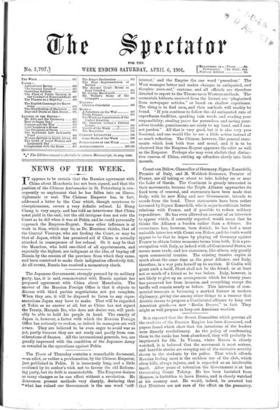Count von Billow, Chancellor of Germany, Signor Zanardelli, Premier of
Italy, and M. Waldeck-Rousseau, Premier of France, are all taking or about to take holiday on or near the Lake of Garda. The Continent is greatly interested in their movements, because the Triple Alliance approaches its fixed term of renewal, and statements have been made that Italy, with its new King and new Government, intends to secede from the bond. These statements have been rather favoured by signor Zanardelli, who is eager to cultivate better relations with France, and if possible to reduce military expenditure. He has even allowed an account of an interview to appear which, if correctly reported, would mean that he thinks the Alliance a burden rather than a defence. Its correctness has, however, been denied; he has had a most amicable interview with Count von Bnlow, and the truth would appear to be that he hopes by playing off Germany against France to obtain better economic terms from both. It is a pre- occupation with Italy, as indeed with all Continental States, to secure more trade, and her statesmen, like others, rely greatly upon commercial treaties. The existing treaties expire at much about the same time as the great Alliance, and Italy, therefore, in a way puts herself up to auction. If Codlin will grant such a tariff, Short shall not be the friend, or at least not so much of a friend as he was before. Italy, however, is not likely to give up an arrangement which for twenty years has preserved her from invasion, and everything except the tariffs will remain nearly as before. This intrusion of com- mercial interests is becoming a marked feature in modern diplomacy, giving rise among other things to a rumour that Austria means to propose a Continental alliance to keep out American goods,—a new "Berlin Decree," in fact. They might as well propose to keep out American weather.






































